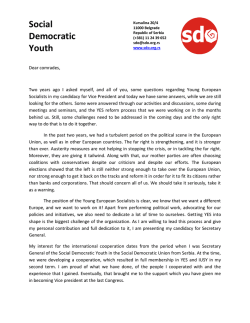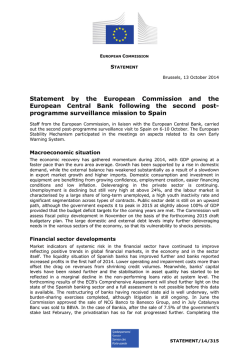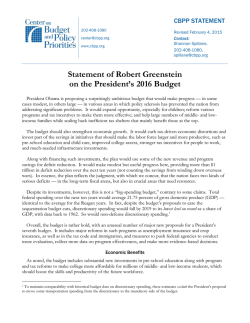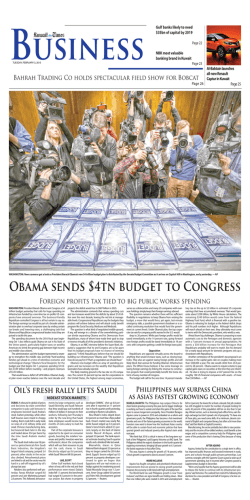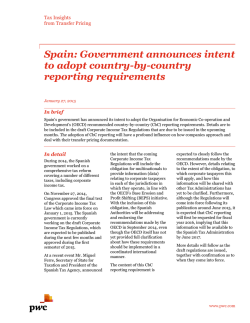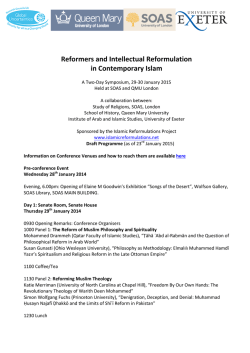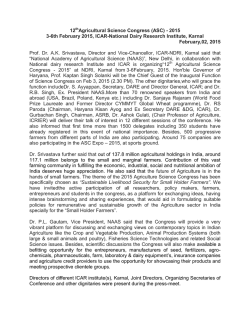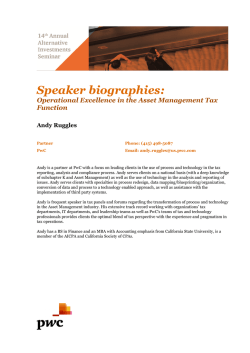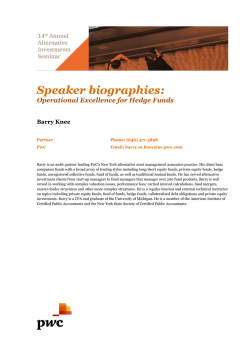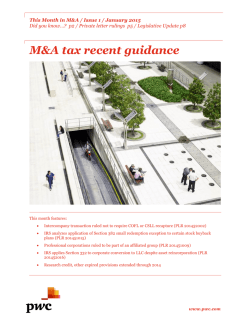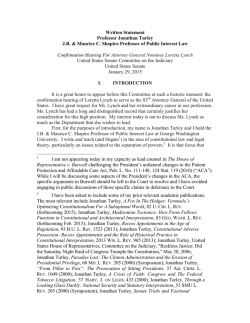
Download PDF
Tax Insights Pharmaceutical and Life Sciences What’s the likelihood of tax reform in the new Congress? January 28, 2015 In brief The key question for US tax policymakers is whether 2015 will be marked by compromise or gridlock. President Barack Obama and Republican leaders in the US House of Representatives and the US Senate have said they want to work together and have identified tax reform as one of the few priority issues on which agreement could be possible. For the President, the next two years are an opportunity to define his second-term legacy. House Speaker John Boehner (R-OH) and Senate Majority Leader Mitch McConnell (R-KY) have said they want to demonstrate an ability to govern ahead of the 2016 presidential election. At the same time, differences between the two political parties may pose challenges for the enactment of significant legislation. In detail Following the 2014 midterm Congressional elections, President Obama called tax reform legislation that “closes loopholes and makes it more attractive to create jobs in the United States” as a key issue on which he hopes to work with the new Republican-controlled Congress. House Speaker Boehner and Senate Majority Leader McConnell also identified reform of an “insanely complex tax code that is driving jobs overseas” as a priority for the 114th Congress. Meanwhile, in December 2014, Congress passed a one-year retroactive extension of the research credit and other temporary business and individual tax provisions; thus, these provisions expired again on December 31, 2014. If, in coming months, President Obama and Congress cannot reach an agreement on business tax reform legislation that would address the expired provisions, look for Congress later this year to make a strong push to make permanent the research credit and certain other business and individual tax provisions that have expired, along with temporary extensions of certain other provisions and possible elimination of some temporary provisions. President Obama outlines tax policy goals President Obama on January 20, 2015, used his sixth State of the Union address to lay out an agenda focused on ‘middle-class economics’ and called on Congress to support proposals that include ‘lowering the taxes of working families’ and paying for those policies by closing tax ‘loopholes’ for corporations and upper-income individuals. President Obama noted his Administration’s proposals for business tax reform, including using revenues from reform for improving US infrastructure and addressing the needs of small businesses, but did not offer new details on his business tax reform proposals in his State of the Union address. A subsequent January 21 address by Treasury Secretary Jack Lew also reaffirmed the Administration’s tax reform goals that were first outlined in a 2012 ‘framework’ for business tax reform without offering new specific reform proposals. Additional details on the Administration’s business tax reform proposals may be provided when President Obama submits his FY 2016 budget to Congress on February 2. The President’s budget also is expected to provide more details on new individual tax proposals recently announced by the www.pwc.com/pharma White House. While the challenges faced by Congress in enacting tax reform – divided government and competing legislative objectives – remain significant, President Obama and the Republican-led Congress continue to identify tax reform as a common goal. The takeaway While many outcomes of tax reform are possible, pharmaceutical and life sciences companies should be prepared for potential changes in the corporate tax landscape. With the new 114th Congress having just recently begun, it will be important to stay engaged in the tax reform discussion as Congressional leaders endeavor to make our tax code one that is globally competitive while fostering strong economic growth. Let’s talk For more information regarding how the potential for tax reform legislation could affect your business, please see the PwC 2015 Tax Policy Outlook: Opportunities and challenges ahead and our Insight: President Obama outlines tax policy goals in State of the Union address. Pharmaceutical and Life Sciences Tax Leader Kathy Michael, Florham Park +1 973 236 4210 [email protected] © 2015 PricewaterhouseCoopers LLP, a Delaware limited liability partnership. All rights reserved. PwC refers to the United States member firm, and may sometimes refer to the PwC network. Each member firm is a separate legal entity. Please see www.pwc.com/structure for further details. SOLICITATION This content is for general information purposes only, and should not be used as a substitute for consultation with professional advisors. pwc
© Copyright 2026
